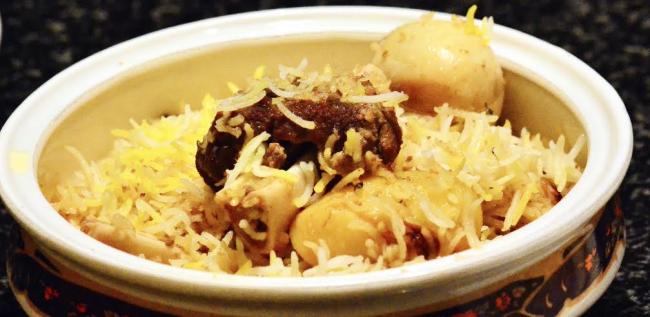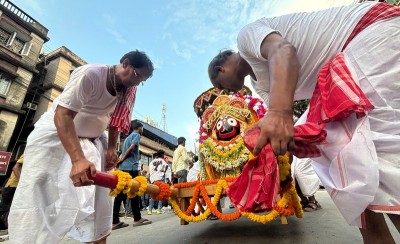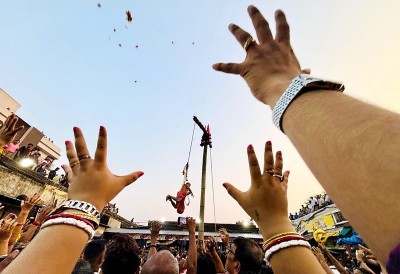July 16, 2025 04:14 am (IST)

Metiabruj Dawaat: A page out of Kolkata's culinary legacy
Kolkata, April 15 (IBNS) Adding the potato was the twist that Metiabruj gave to the typical Awadhi biryani explained Shahanshah Mirza, the great-great grandson of Nawab Wajid Ali Shah, at a dinner meet at Kolkata-based ITC Sonar, which is hosting a special Metiabruj Dawaat festival from April 16 -23, 2016.
The British sent the last independent ruler of Awadh (Oudh), Nawab Wajid Ali Shah on exile to Calcutta (as Kolkata was known then) in 1856. With his full entourage from Lucknow, the Nawab settled down in an area known as Matiya Burj, named after an old ‘mud fort’, where he created a mini Lucknow.
Unfortunately, after the death of the Nawab, with the British trying to obliterate everything that belonged to him, the area soon lost its charms. Today, the Imambara (where lies buried the Nawab and many of his descendants) and the Shahi Masjid are all that remains.
.jpg) As part of their effort to revive India’s regional and mostly forgotten cuisine, ITC Hotels have been regularly holding various food festivals, where diners get to taste the unique dishes of India. The Metiabruj Daawat is part of this concerted effort.
As part of their effort to revive India’s regional and mostly forgotten cuisine, ITC Hotels have been regularly holding various food festivals, where diners get to taste the unique dishes of India. The Metiabruj Daawat is part of this concerted effort.
Cooking in the Nawab’s kitchen not only meant experimenting but also preparing a balanced meal, with regular inputs from the royal hakim (physician). Although the royal bawarchis (cooks) fiercely guarded their secret recipes, they could not avoid the local influence.
One of the distinct features of the Kolkata biryani is the addition of a boiled potato (and an egg) to the dish. Many say that the Nawab could not afford to feed his large retinue and had asked the kitchen to supplement the meat with potato.
Mirza rubbished the claim that the Nawab had introduced the potato because his coffers were diminishing. “The Nawab used to maintain a large open-air zoo and regularly bought animals or birds for the zoo, which indicates that the Nawab did not run out of funds,” he explained.
Fatima Mirza, his wife added, “The Nawab’s bawarchis were known for experimenting. It is more likely that on one such occasion, potatoes may have been added and the dish tasted fine. So adding the potato became a fashion.”
According to the Mirzas, the culinary style that evolved in the Metiabruj kitchen of the Nawab was essentially Awadhi, with the spices and other additives reduced owing to the weather. For example, the use of saffron, mace and desi ghee was tempered down.
.jpg) There is little record of the recipes that were used in the Nawab’s Metiabruj home. So chef Manzoor Alam, who hails from a family of bawarchis, was born and raised in Metiaburj, dug into his family recipes, and guided by the Mirzas, crafted a special menu for the festival.
There is little record of the recipes that were used in the Nawab’s Metiabruj home. So chef Manzoor Alam, who hails from a family of bawarchis, was born and raised in Metiaburj, dug into his family recipes, and guided by the Mirzas, crafted a special menu for the festival.
There are both vegetarian and non-vegetarian options -- gosht biryani, alu-chana dal biryani, mughlai paratha, and a variety of kebab, tikka and chaamp made from paneer, mutton. chicken and fish. Dahi Pudina ghol, subz raita, dahi ka salad, etc will be served as accompaniments. Desserts include phirni, laccha and zarda pulao.
“The new cuisine that was familiar in texture yet unique in flavour,” was how Atul Bhalla, General Manager, ITC Sonar, defined the Metiabruj cuisine. While answering an IBNS query regarding the legacy of Metiabruj, he said in the future, they might also consider exploring the kite-making and kite-flying legacy of the neighbourhood and weave them into the festival.
Part of the ITC Hotel’s Kitchens of India brand, the Metaibruj Dawaat food festival is being held at the Eden Pavilion restaurant of ITC Sonar as a dinner buffet.
Images: Sanjoy Ganguly
Support Our Journalism
We cannot do without you.. your contribution supports unbiased journalism
IBNS is not driven by any ism- not wokeism, not racism, not skewed secularism, not hyper right-wing or left liberal ideals, nor by any hardline religious beliefs or hyper nationalism. We want to serve you good old objective news, as they are. We do not judge or preach. We let people decide for themselves. We only try to present factual and well-sourced news.
Support objective journalism for a small contribution.
Latest Headlines
Kolkata-based NGO hosts Colours of Courage to celebrate LGBTQ+ pride and empowerment
Sat, Jul 05 2025
How to Use a Diffuser on Curly Hair: A Beginner’s Guide
Tue, Jun 24 2025
Kolkata: IACC celebrates rich culinary heritage of India, USA
Fri, Jun 20 2025
CONVERSATION: Indian firms are seeking French-proficient engineers, says Alliance Francaise du Bengale head Nicolas Facino
Thu, Jun 19 2025
Jyoti Mahipal installed as 50th Association President of Inner Wheel Clubs in India
Wed, Jun 18 2025
Kolkata: UK-India colab showcases wildlife and conservation through visual storytelling
Wed, Jun 11 2025
Firpo’s: Remembering a slice of colonial Calcutta’s nightlife
Mon, Jun 09 2025







